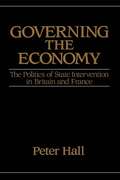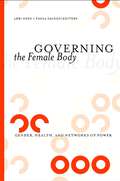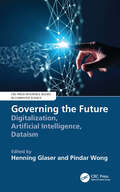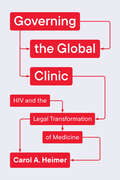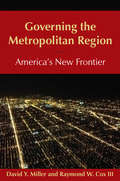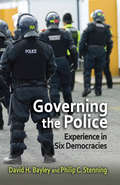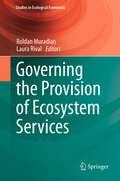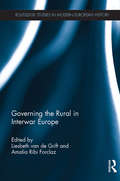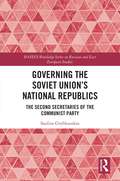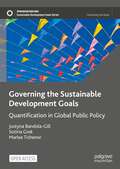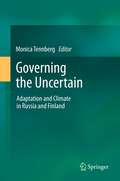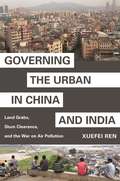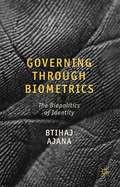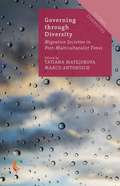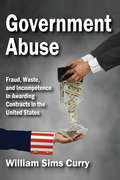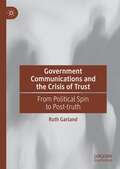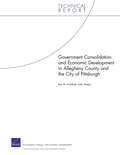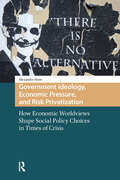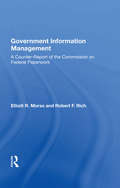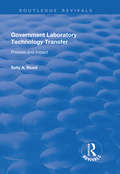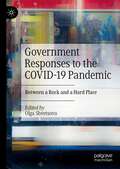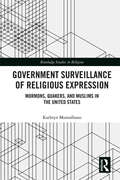- Table View
- List View
Governing the Economy: The Politics of State Intervention in Britain and France (Europe And The International Order Ser.)
by Peter A. HallFor over one hundred years, the British economy has been in decline relative to other industrialized countries. <p><p>This book explores the origins of Britain's economic problems and develops a striking new argument about the sources of decline. It goes on to analyze the evolution of economic policy in postwar Britain from the development of Keynesianism to the rise of monetarism under Margaret Thatcher. France, by contrast, experienced an economic miracle in the postwar period. <p><p>Hall argues that the French state transformed itself and then its society through an extensive system of state intervention. In the recent period, however, the French system has encountered many difficulties, and the book locates their sources in the complex interaction between state and society in France culminating in the socialist experiment of Francois Mitterrand. <p><p>Through his insightful, comparative examination of policy-making in Britain and France, Hall develops a new approach to state-society relations that emphasizes the crucial role of institutional structures.
Governing the Female Body: Gender, Health, and Networks of Power
by Lori Reed Paula SaukkoDrawing on Foucault's notion of governmentality, this collection explores relations between the intimate governance of bodies and political governance. The contributors offer empirically grounded yet theoretically sophisticated case studies showing how gendered, racialized, and socioeconomic agendas structure medical and scientific practices. Developing and utilizing a poststructuralist feminist framework, the chapters investigate emerging gendered discourses and practices around health, such as breast cancer charities, lifestyle genetic testing, new reproductive technologies, and the development and marketing of various psychotropic and hormonal drugs. This will be a key reader for anyone interested in the social implications of cutting edge medical technologies.
Governing the Future: Digitalization, Artificial Intelligence, Dataism (CRC Press Reference Books in Computer Science)
by Henning Glaser Pindar WongWe are living in times of deep and disruptive change. Perhaps the most powerful vector of this change can be described by three related catchphrases: digitalization, artificial intelligence, and dataism. Drawing on considerable expertise from a wide range of scholars and practitioners, this interdisciplinary collection addresses the challenges, impacts, opportunities and regulation of this civilizational transformation from a variety of angles, including technology, philosophy, cultural studies, international law, sociology and economics. This book will be of special interest to scholars, students, analysts, policy planners, and decision-makers in think tanks, international organizations, and state agencies studying and dealing with the development and governance of disruptive technologies.
Governing the Global Clinic: HIV and the Legal Transformation of Medicine (Chicago Series in Law and Society)
by Carol A. HeimerA deep examination of how new, legalistic norms affected the trajectory of global HIV care and altered the practice of medicine. HIV emerged in the world at a time when medicine and healthcare were undergoing two major transformations: globalization and a turn toward legally inflected, rule-based ways of doing things. It accelerated both trends. While pestilence and disease are generally considered the domain of biological sciences and medicine, social arrangements—and law in particular—are also crucial. Drawing on years of research in HIV clinics in the United States, Thailand, South Africa, and Uganda, Governing the Global Clinic examines how growing norms of legalized accountability have altered the work of healthcare systems and how the effects of legalization vary across different national contexts. A key feature of legalism is universalistic language, but, in practice, rules are usually imported from richer countries (especially the United States) to poorer ones that have less adequate infrastructure and fewer resources with which to implement them. Challenging readers to reconsider the impulse to use law to organize and govern social life, Governing the Global Clinic poses difficult questions: When do rules solve problems, and when do they create new problems? When do rules become decoupled from ethics, and when do they lead to deeper moral commitments? When do rules reduce inequality? And when do they reflect, reproduce, and even amplify inequality?
Governing the Metropolitan Region: America's New Frontier
by David Y Miller Raymond CoxThis text is aimed at the basic local government management course (upper division or graduate) that addresses the structural, political and management issues associated with regional and metropolitan government. It also can complement more specialized courses such as urban planning, urban government, state and local politics, and intergovernmental relations.
Governing the Police: Experience in Six Democracies
by David BayleyEvery modern democracy in our increasingly complex world must confront a fundamental problem: how should politicians manage police, ensuring that they act in the public interest while avoiding the temptation to utilize them in a partisan manner? Drawing on first-hand experiences from six democracies, the authors describe how frequently disagreements arise between politicians and police commanders, what issues are involved, and how they are resolved.Governing the Police is organized into three parts: the intellectual and governmental context of democratic governance; the experience of chief officers in that relationship; and the reflections on lessons learned. Instead of describing practices within each individual country, it compares them across countries, developing generalizations about practices, explanations for differences, and assessments of success in managing the police/political relationship.Focusing mainly on the daily, informal interactions between politicians and police as they balance their respective duties, this book compares the experiences and opinions of chief police officers in Australia, Britain, Canada, India, New Zealand, and the United States. By examining the experiences of important officials, the authors explain how the balance between accountability and independence can be managed and what challenges leaders face. The authors conclude by posing well-informed recommendations for improving police governance.
Governing the Provision of Ecosystem Services
by Roldan Muradian Laura RivalFounded on the core notion that we have reached a turning point in the governance, and thus the conservation, of ecosystems and the environment, this edited volume features more than 20 original chapters, each informed by the paradigm shift in the sector over the last decade. Where once the emphasis was on strategies for conservation, enacted through instruments of control such as planning and 'polluter pays' legislation, more recent developments have shown a shift towards incentive-based arrangements aimed at those responsible for providing the environmental services enabled by such ecosystems. Encouraging shared responsibility for watershed management, developed in Costa Rica, is a prime example, and the various interests involved in its instauration in Java are one of the subjects examined here.
Governing the Rural in Interwar Europe (Routledge Studies in Modern European History)
by Liesbeth van de Grift Amalia Ribi ForclazThis book examines how rural Europe as a hybrid social and natural environment emerged as a key site of local, national and international governance in the interwar years. The post-war need to secure and intensify food production, to protect contested border areas, to improve rural infrastructure and the economic viability of rural regions and to politically integrate rural populations, gave rise to a variety of schemes aimed at modernizing agriculture and remaking rural society. The volume examines discourses, institutions and practices of rural governance from a transnational perspective, revealing striking commonalities across national and political boundaries. From the village town hall to the headquarters of international organizations, local authorities, government officials and politicians, scientific experts and farmers engaged in debates about the social, political and economic future of rural communities. They sought to respond to both real and imagined concerns over poverty and decline, backwardness and insufficient control, by conceptualizing planning and engineering models that would help foster an ideal rural community and develop an efficient agricultural sector. By examining some of these local, national and international schemes and policies, this volume highlights the hitherto under-researched interaction between policymakers, experts and rural inhabitants in the European countryside of the 1920s and '30s.
Governing the Soviet Union's National Republics: The Second Secretaries of the Communist Party (BASEES/Routledge Series on Russian and East European Studies)
by Saulius GrybkauskasSecond Secretary of the Central Committee of a Soviet republic does not sound a very important position, but as this book shows it was an extremely important role, one that helped hold the Soviet Union together and helped to keep it going for so long. The key was that Second Secretaries were both members of a Soviet republic’s ruling body and at the same time members of the All-Union ruling elite - they were often characterised as Moscow’s governor generals. This book examines how the position of Second Secretary was established by Khrushchev in the 1950s, explores how it took on increasingly important political functions representing Moscow’s interests in the republics and the republics’ interests in Moscow, and discusses how the conflicts, inherent in the role, developed. The book also provides biographical details of the people who held the position and argues that the role was extremely effective in managing what could otherwise have been very difficult relationships between centre and periphery.
Governing the Sustainable Development Goals: Quantification in Global Public Policy (Sustainable Development Goals Series)
by Sotiria Grek Justyna Bandola-Gill Marlee TichenorThis open access book conceptualises the Sustainable Development Goals as epistemic infrastructures that connect numbers, networks and governing paradigms.The book approaches quantification not merely as a tool for governing, but rather as a broader epistemic system through which global public policy is produced. This book focuses on the role of international organisations in shaping and implementing the 2030 Agenda and demonstrates how the SDGs have transformed and accelerated trends in quantification.
Governing the Uncertain
by Monica TennbergThe book provides a detailed analysis of the development of adaptive governance in Russia and Finland. It presents a case study from the Sakha Republic in Russia that focuses on community's participation in the process of governing of the flood events in the Tatta River area. Local adaptive practices are analyzed in relation to federal and regional responses that may mandate, encourage or collide with community's agency. A second case study is centered on the Finnish community of Kuttura, Ivalo. It explores the mounting challenges presented by changing environmental conditions to traditional reindeer herding, as well as the efforts made to cope with these new factors. Combining anthropological research and political science, this penetrating work offers revealing scrutiny of governmental responses to one of the most urgent issues facing both politicians and the citizens who live in their domains.
Governing the Urban in China and India: Land Grabs, Slum Clearance, and the War on Air Pollution (Princeton Studies in Contemporary China #10)
by Xuefei RenAn in-depth look at the distinctly different ways that China and India govern their cities and how this impacts their residentsUrbanization is rapidly overtaking China and India, the two most populous countries in the world. One-sixth of humanity now lives in either a Chinese or Indian city. This transformation has unleashed enormous pressures on land use, housing, and the environment. Despite the stakes, the workings of urban governance in China and India remain obscure and poorly understood.In this book, Xuefei Ren explores how China and India govern their cities and how their different styles of governance produce inequality and exclusion. Drawing upon historical-comparative analyses and extensive fieldwork (in Beijing, Guangzhou, Wukan, Delhi, Mumbai, and Kolkata), Ren investigates the ways that Chinese and Indian cities manage land acquisition, slum clearance, and air pollution. She discovers that the two countries address these issues through radically different approaches. In China, urban governance centers on territorial institutions, such as hukou and the cadre evaluation system. In India, urban governance centers on associational politics, encompassing contingent alliances formed among state actors, the private sector, and civil society groups. Ren traces the origins of territorial and associational forms of governance to late imperial China and precolonial India. She then shows how these forms have evolved to shape urban growth and residents’ struggles today.As the number of urban residents in China and India reaches beyond a billion, Governing the Urban in China and India makes clear that the development of cities in these two nations will have profound consequences well beyond their borders.
Governing through Biometrics
by Btihaj AjanaManaging identity through biometric technology has become a routine and ubiquitous practice in recent years. This book interrogates what is at stake in the merging of the body and technology for surveillance and securitization purposes drawing on a number of critical theories and philosophies.
Governing through Diversity: Migration Societies In Post-multiculturalist Times (Global Diversities)
by Marco Antonsich Tatiana MatejskovaThis cross-disciplinary edited collection presents an integrated approach to critical diversity studies by gathering original scholarly research on ideational, technical and actual social dimensions of contemporary governance through diversity.
Governing with Words
by Gillion Daniel Q.Rather than considering political discussions and rhetoric as symbolic, inconsequential forms of politics, Governing with Words conceptualizes them as forms of government action that can shape institutions and societal norms. Daniel Q. Gillion refers to this theory as 'discursive governance'. Federal politicians' statements about racial and ethnic minority concerns aid the passage of minority public policies and improve individual lifestyle behaviors. Unfortunately, most of the American public continues to disapprove of politicians' rhetoric that highlights race. The book argues that addressing racial and ethnic inequality continues to be a tug-of-war between avoiding the backlash of the majority in this nation while advocating for minority interests. Even though this paradox looms over politicians' discussions of race, race-conscious political speech, viewed in its entirety, is the mechanism by which marginalized groups find a place in the democratic process. Such race-conscious discussions, the book argues, have ramifications both within and outside of government.
Government Abuse: Fraud, Waste, and Incompetence in Awarding Contracts in the United States
by William Sims CurryGovernment contracting is plagued by nefarious, amateurish, and criminal behavior. By awarding government contracts to corporations as compensation for lavish gifts and personal favors, the United States government fails to serve the public interest effectively and honestly. William Sims Curry identifies and categorizes multiple deficiencies in how government contractors are selected, and proposes how reforms can be instituted.This book is based on extensive research. Curry sifted through two years worth of contractor claims maintained by the Government Accountability Office (GAO) regarding improper behavior of federal government agencies during the contract award process. He identified additional government contracting failures through review of media stories, inspector general reports, court cases, and press releases by government investigatory agencies.Much of this abuse originates from the mandated but ineffective practice of color coding rating proposals and a subjective ratings system. Curry proposes replacing the current practice with a scoring system that weighs contractor selection criteria according to the government's needs. This, along with the other procurement reforms Curry recommends, offers promise for an alternative to the fraud, waste, and incompetence currently rampant in government contracting.
Government Communications and the Crisis of Trust: From Political Spin to Post-truth
by Ruth GarlandThis book opens up the black box of government communication during the age of political spin, using archival and official documents, memoirs and biographies, and in-depth interviews with media, political and government witnesses. It argues that substantive and troubling long-term changes in the ways governments manage the media and publicly account for themselves undermine the public consent essential to democracy. Much of the blame for this crisis in public communication has been placed at the feet of politicians and their aides, but they are just part of the picture. A pervasive ‘culture of mediatization’ has developed within governments, leading to intended and unintended consequences that challenge the capacity of central public bureaucracies to implement public values and maintain impartiality. It concludes that public servants, elected officials and citizens have an important role to play in accounting for governments’ custodianship of this most politically-sensitive of public goods – the public communications function.
Government Consolidation and Economic Development in Allegheny County and the City of Pittsburgh
by Sally Sleeper Rae W. ArchibaldThis report concludes that, although evidence is mixed and effects difficult to measure, consolidating the City of Pittsburgh and Allegheny County could enhance economic development by unifying leadership, improving policy direction and coordination, and sharpening economic-development initiatives. Increased collaboration with the private sector also is important, and combining only two governments still leaves the region highly fragmented.
Government Ideology, Economic Pressure, and Risk Privatization: How Economic Worldviews Shape Social Policy Choices in Times of Crisis (Changing Welfare States)
by Alexander HornFrom the 1980s on, a privatization of labor market-related risks has occurred in the OECD. Governments have cut the generosity of social programs and tightened eligibility rules, particularly for the unemployed. Government Ideology, Economic Pressure, and Risk Privatization: How Economic Worldviews Shape Social Policy Choices in Times of Crisis analyses these curtailments for eighteen countries over the course of four decades and provides an encompassing comparative assessment of the interactive impact of government ideology and economic pressure. It demonstrates that the economic worldviews of governments are the most important factor in explaining why cuts are implemented or not. While ideas of non-intervention in the market underlie cuts in generosity, ideas of equality and fairness are at the heart of stricter eligibility criteria. This book also shows that the impact of the economic pressures often held responsible for the marginalization of politics and government ideology is in fact conditional on the specific ideological configuration.
Government Information Management: A Counterreport Of The Commission On Federal Paperwork
by Elliott R. MorssIn this timely critique of federal procedures, the authors identify the underlying causes of the current overload of information/paper-work in government and explain why the problem cannot be controlled until the causes are eliminated or neutralized. Using a calcuius they have developed for estimating the "value and "burden of federal information,
Government Laboratory Technology Transfer: Process and Impact (Routledge Revivals)
by Sally A RoodThis title was first published in 2000: Due to budget cuts and competitiveness pressures, determining the outcome of technology transfer from government R&D laboratories to private industry and entrepreneurial start-ups is of increasing interest. This book presents a series of case studies of successful technology transfer by examining the same list of topics for each case. It presents a format for analyzing the cases, topic by topic - a methodology that could be used by any R&D laboratory. The book also goes one step further and compares the cases that took place prior to national technology transfer legislation with those cases that took place after passage of such legislation. An additional feature is the summary of existing attempts to measure and evaluate technology transfer. This follows a backgroudn section on the technology policy context. The analysis finds that there is a significant commercial impact from government laboratory transfer using this approach.
Government Responses to the COVID-19 Pandemic: Between a Rock and a Hard Place
by Olga ShvetsovaThis book examines how governments around the world responded to the health emergency created by the COVID-19 pandemic. Before vaccines became available, non-medical interventions were the main means to protect the public. Non-medical interventions were put in place by governments as public health policies. In every nation, politicians and governments faced a choice situation, and worldwide, they made different choices. Public health policies came at a price, in economic, social, and ultimately electoral costs to the political incumbents. The book discusses differences in governments’ policy efforts to mitigate the virus spread. The authors conduct in-depth analysis of country-cases from Africa, North and South America, Asia, and Europe. They also offer small-n- comparative analyses as well as report global patterns and trends of governments’ responsiveness to the medical emergency. It will appeal to all those interested in public policy, health policy and governance.
Government Surveillance of Religious Expression: Mormons, Quakers, and Muslims in the United States (Routledge Studies in Religion)
by Kathryn MontalbanoRecent revelations about government surveillance of citizens have led to questions about whether there should be better defined boundaries around privacy. Should government officials have the right to specifically target certain groups for extended surveillance? United States municipal, territorial, and federal agencies have investigated religious groups since the nineteenth century. While critics of contemporary mass surveillance tend to invoke the infringement of privacy, the mutual protection of religion and public expression by the First Amendment positions them, along with religious expression, comfortably within in the public sphere.This book analyzes government monitoring of Mormons of the Territory of Utah in the 1870s and 1880s for polygamy, Quakers of the American Friends Service Committee (AFSC) from the 1940s to the 1960s for communist infiltration, and Muslims of Brooklyn, New York, from 2002 to 2013 for suspected terrorism. Government agencies in these case studies attempted to understand how their religious beliefs might shape their actions in the public sphere. It follows that government agents did not just observe these communities, but they probed precisely what constituted religion itself alongside shifting legal and political definitions relative to their respective time periods. Together, these case studies form a new framework for discussions of the historical and contemporary monitoring of religion. They show that government surveillance is less predictable and monolithic than we might assume. Therefore, this book will be of great interest to scholars of United States religion, history, and politics, as well as surveillance and communication studies.
Government Today Workbook
by Beverly VaillancourtThis book contains unit lessons on Government and the Rights of People Workbook Activity, Freedoms-You and the Constitution, The Executive Branch, The Offices of the Executive Branch, The Legislative Branch and The Judicial Branch.
